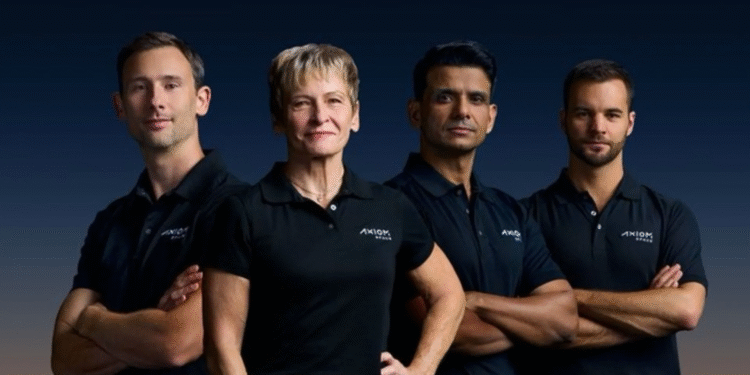NASA has postponed the June 22 launch of the Axiom-4 mission to the International Space Station, citing scheduling adjustments. A new launch date will be announced soon
NASA has officially announced the delay of the highly anticipated Axiom-4 (Ax-4) mission to the International Space Station (ISS), which was originally scheduled for launch on June 22, 2025. The mission, organized by Axiom Space in collaboration with NASA and SpaceX, marks the latest step in the growing trend of private spaceflight missions to low Earth orbit. However, the delay reflects the increasingly complex dynamics of managing traffic to and from the space station.
According to a statement released by NASA on June 19, the Ax-4 mission is being postponed due to “necessary adjustments to space station scheduling.” While the agency did not cite any technical faults or safety concerns, officials emphasized the need to ensure optimal mission conditions and ISS availability. A revised launch date is expected to be announced shortly.
The Axiom-4 mission is part of a broader initiative to commercialize low Earth orbit and build a pathway for a permanent private presence in space. Headquartered in Houston, Axiom Space has been a key player in this arena, previously launching successful private astronaut missions to the ISS under the Ax-1, Ax-2, and Ax-3 banners.
Ax-4 was slated to carry a team of four private astronauts aboard a SpaceX Crew Dragon spacecraft, launched atop a Falcon 9 rocket from NASA’s Kennedy Space Center in Florida. These astronauts were to spend approximately 14 days aboard the ISS, engaging in a range of scientific research, educational outreach, and commercial activities.

While the identities of all four crew members have not been fully disclosed, the team is expected to include international participants, highlighting the global nature of modern space exploration and the role of commercial space companies in democratizing access to orbit.
n its official communication, NASA stated that the delay was necessary to “deconflict” with other scheduled operations aboard the ISS. This includes ongoing experiments, crew rotations, and cargo missions. While the ISS remains a marvel of international cooperation, it is also a highly orchestrated environment with limited docking ports, tight timelines, and numerous concurrent activities.
The postponement underscores the logistical complexities of integrating private missions into a space station traditionally operated by government agencies such as NASA, ESA (European Space Agency), Roscosmos (Russia), and JAXA (Japan).
Additionally, space weather forecasts, launch range availability, and technical reviews also contribute to last-minute changes in launch windows. In this case, however, no such technical reasons were cited, suggesting that the delay is more of a scheduling reshuffle than an engineering setback.
Despite the delay, NASA reaffirmed its commitment to supporting commercial spaceflight as a cornerstone of its future space strategy.
In fact, missions like Ax-4 are vital to NASA’s Commercial Low Earth Orbit Development Program, which aims to eventually replace the ISS with commercially owned and operated space stations by the end of this decade.
NASA Administrator Bill Nelson has previously stated that public-private partnerships are “essential to ensuring the U.S. maintains its leadership in space exploration and low Earth orbit operations.”
In that spirit, Axiom missions are not only scientific endeavors but also crucial test cases for how private industry can support human spaceflight, life support systems, mission logistics, and long-duration orbital stays without the traditional government infrastructure.
Axiom Space has ambitious plans beyond temporary ISS missions. The company is currently developing Axiom Station, the world’s first commercial space station, which is planned to be assembled in orbit beginning in 2026. The modules of this station will initially dock with the ISS but are eventually intended to function independently once the ISS is decommissioned.

Each Axiom mission not only allows for more access to low Earth orbit but also serves as a proof of concept for Axiom’s larger vision—commercial space tourism, industrial research, and microgravity manufacturing in orbit.
The Ax-4 mission would have been the fourth such voyage and another step forward in operationalizing these plans.While the delay is understandably a disappointment for the mission crew and those tracking the commercial space industry, it is not entirely unexpected. Space missions, particularly those involving human passengers, are subject to rigorous protocols, timing considerations, and a range of unpredictable variables.
Once a new date is confirmed, NASA, SpaceX, and Axiom Space are expected to proceed with final preparations, including pre-launch simulations, health checks, hardware testing, and weather assessments. The new launch date will likely be influenced by the ISS’s traffic schedule, existing crew rotations, and SpaceX’s own launch calendar.
The public’s interest in private astronaut missions continues to rise, especially as space becomes more accessible to civilians, researchers, and even entertainers. Past missions have included former astronauts, investors, researchers, and government dignitaries from countries without independent space programs.
Social media buzz around Ax-4 had already begun to build in anticipation of the June 22 launch, and while the delay may temper excitement temporarily, it is expected to resume once a new date is set. The inclusion of private astronauts and possible international figures ensures the mission retains high public and media interest.















 Categories
Categories









